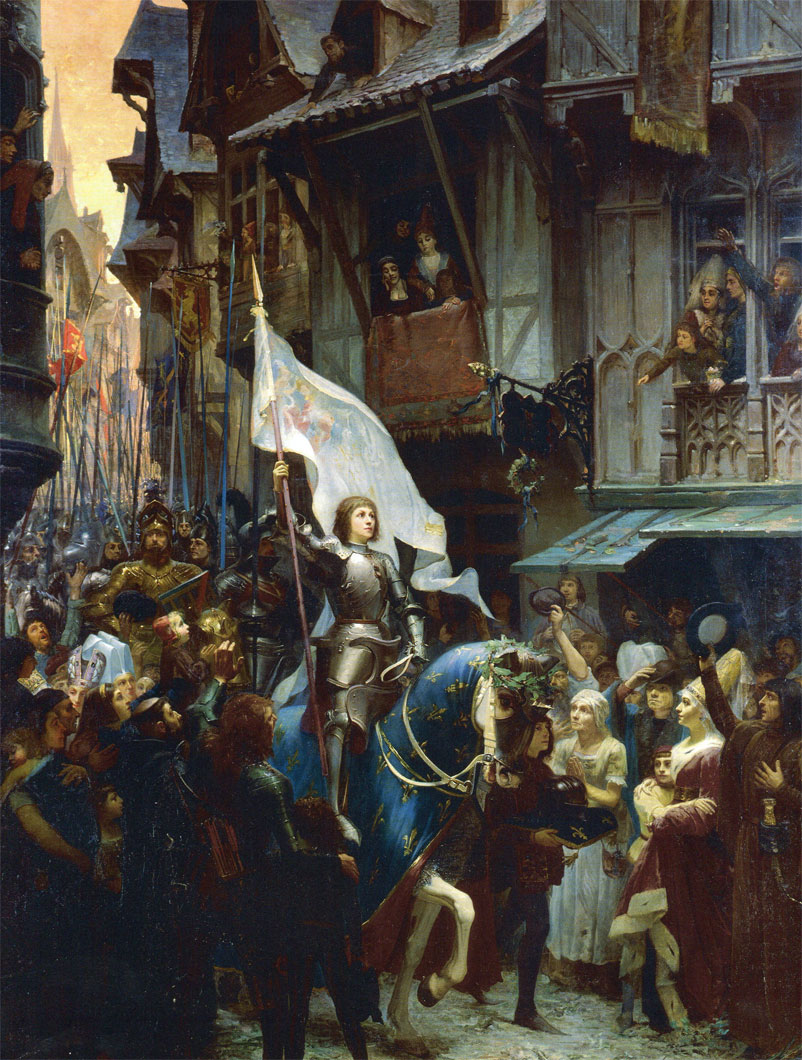Former President Donald Trump was found guilty on 34 felony counts in New York City on May 30, the feast day of St. Joan of Arc, the patron saint of prisoners who is revered by Catholics and admired by patriots everywhere as a pillar of strength in the face of political persecution.
On Thursday evening, a Manhattan jury found Trump guilty of all 34 felony counts brought against him by District Attorney Alvin Bragg (D), linked to billionaire George Soros. The guilty verdict states that Trump falsified business records.
Trump’s sentencing is set for July 11. Each of the 34 felony counts carries a maximum $5,000 fine and a four-year prison sentence.
Joan of Arc, revered as a martyr in the Catholic Church and canonized as a saint in 1920, was a teenager when she saw visions of St. Catherine, St. Michael, and St. Margaret who told her that it was her destiny to save war-torn and enemy-occupied France, lead her countrymen to victory against the English, and crown the French Dauphin (or crown prince) king.
In April 1429, at the age of seventeen, Joan fulfilled the first part of this mission when she led an army of Frenchmen to victory against the English who were besieging the French city of Orleans, a feat for which she became known as “the Maid of Orleans.”

Joan of Arc’s triumphant entry into the city of Orleans. (Oil on canvas by Jean-Jacques Scherrer, 1887)
Victory soon followed victory for Joan, as her army recaptured whole sections of France that had fallen to the forces of the English king during the Hundred Years’ War. Joan’s army freed the path to Reims, the city where the French kings were historically crowned. There, in July 1429, she lead the Dauphin to Reims Cathedral where he was crowned King Charles VII.
Her political fortunes, however, quickly changed. Though Joan insisted on completely freeing her country from the English forces, the powers at the French court demurred. She was captured by her enemies in 1430 as she was fighting to free the city of Compiegne. She was then ransomed and sold to the English, who assembled a corrupt jury of churchmen who were loyal to the English king. They put her on trial in January 1431 for witchcraft and heresy.
She endured terrible persecutions in prison by her enemies, who kept her shackled by the hands and feet and deprived her of sleep because she lived in constant fear of being raped by her guards.
Despite this treatment, her answers during the trial were remarkable for their intelligence, courage, and piety. Joan, an illiterate peasant teenager, consistently outsmarted her learned judges.
The fix was in though. Joan’s enemies ensured her guilt. On May 30, 1431, she was burned at the stake as a heretic. To the very end, she affirmed her innocence and her faith in Jesus whose name was the last word she spoke. Before her death, she predicted that her country would be freed of all the English and that the corrupt judges who condemned her would meet justice. This happened as she predicted.
In 1453, the English were defeated in France. The French King Charles VII — following the request of Joan’s mother and the merchant middle class of Orleans who never forgot Joan’s courage in freeing their besieged city — petitioned the Vatican to investigate the corrupt trial that condemned Joan. A full investigation was ordered by the pope. Hundreds of people were interviewed to determine the truth of Joan’s character. After an exhaustive inquiry that spanned years and covered all of France and included noblemen, churchmen, and peasants, Pope Callixtus III overturned Joan’s heresy conviction in 1456 and condemned the perfidy of her corrupt judges.
Joan is regarded as the patron saint of prisoners, as well as the patron saint of France and of soldiers. Throughout the ages, she has been regarded as a hero to true patriots who love their country.
“With Joan of Arc love of country was more than a sentiment—it was a passion. She was the Genius of Patriotism—she was Patriotism embodied, concreted, made flesh, and palpable to the touch and visible to the eye,” the great American novelist and humorist Mark Twain wrote in his book Personal Recollections of Joan of Arc.
Perhaps with the story of St. Joan of Arc’s political persecution and ultimate vindication in mind, Bishop Robert Barron posted a tweet imploring St. Joan of Arc to “pray for us” right as the Trump trial verdict came in.
Rebecca Mansour is Senior Editor-at-Large for Breitbart News. Follow her on Twitter at @RAMansour.
John Binder is a reporter for Breitbart News. Email him at jbinder@breitbart.com. Follow him on Twitter here.
